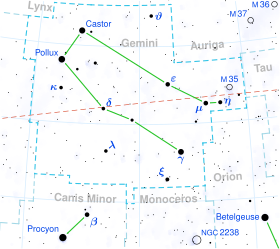6 Geminorum
Red supergiant star in the constellation Gemini From Wikipedia, the free encyclopedia
6 Geminorum is a variable star in the zodiac constellation of Gemini, located roughly 5,800 light years away from the Sun. It has the variable star designation BU Geminorum; 6 Geminorum is the Flamsteed designation. At its brightest this reddish hued star is barely visible to the naked eye but is readily visible with binoculars, found southeast of M 35, just to the south of WY Geminorum. It is moving further from the Earth with a heliocentric radial velocity of +27 km/s.[5] The star is a member of the Gemini OB1 association.[12]
| Observation data Epoch J2000 Equinox J2000 | |
|---|---|
| Constellation | Gemini |
| Right ascension | 06h 12m 19.09884s[1] |
| Declination | +22° 54′ 30.6531″[1] |
| Apparent magnitude (V) | 5.74 – 8.10[2] |
| Characteristics | |
| Spectral type | M1-2 Ia-Iab[3] |
| U−B color index | +1.93[4] |
| B−V color index | +1.63[4] |
| Variable type | LC[2] |
| Astrometry | |
| Radial velocity (Rv) | +27.16±0.42[5] km/s |
| Proper motion (μ) | RA: +0.144[1] mas/yr Dec.: −2.085[1] mas/yr |
| Parallax (π) | 0.5642±0.0957 mas[1] |
| Distance | approx. 5,800 ly (approx. 1,800 pc) |
| Absolute magnitude (MV) | −6.32[6] |
| Details | |
| Mass | ~20[7] M☉ |
| Radius | 821+60 −27[8] R☉ |
| Luminosity | 86,000[9] L☉ |
| Surface gravity (log g) | 0.0[6] cgs |
| Temperature | 3,789[10] K |
| Other designations | |
| 6 Gem, BU Gem, BD+22°1220, GC 7896, HD 42543, HIP 29450, HR 2197, SAO 78098, TYC 1877-1719-1, 2MASS J06121911+2254305[11] | |
| Database references | |
| SIMBAD | data |
This is an evolved red supergiant with a stellar classification of M1-2 Ia-Iab.[3] It is a semiregular variable star, ranging from visual magnitude +5.7 down to +7.5 over a period of 325 days. It has been given the sub-classification of Lc, which means "Irregular variable supergiants of late spectral types having amplitudes of about 1 mag. in V.O".[13] The star has expanded to 821[8] times the Sun's radius and is radiating 86,000[9] times the luminosity of the Sun from its swollen photosphere at an effective temperature of 3,789 K.[10]
- Messier 35, with 6 Gem visible right at the bottom edge of the image
References
Wikiwand - on
Seamless Wikipedia browsing. On steroids.



